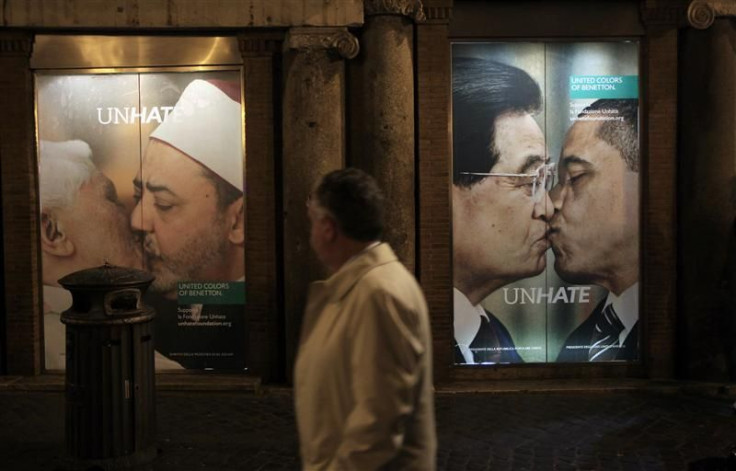Benetton ‘Unhate’ Campaign Ads: A Stroke of Genius
Opinion

We still live in a world where the subtexts of most advertisements are racist, sexist and deeply prejudiced against marginalized populations. But when the Benetton group launched an advertising campaign, featuring world leaders in a liplock, all hell broke loose.
Apparently what the haters of the Unhate campaign failed to see was a progressive subtext of tolerance between warring countries and religions, rendered provocatively by portraying the leaders as icons.
If one fails to see President Obama or Pope Benedict XVI as a representative icons of America and Christianity, respectively, the series of Benetton photographs does not serve its intended purpose. The campaign might then look like promoting homosexuality and obscenity designed to offend sensibilities. But the error of judgment need not come from the person who is doing it; it might come from others, who err in getting it right.
Following the Vatican protest against the provocative portrayal of Pope Benedict XVI kissing the leading Egyptian Imam, the White House also issued a statement condemning Benetton for the campaign.
The White House has a longstanding policy disapproving of the use of the president's name and likeness for commercial purposes, said White House spokesman Eric Schultz on Thursday. Obama was shown kissing his Venezuelan and Chinese counterparts, Hugo Chavez and Hu Jintao.
Interestingly, people seem divided on the issue, with many threatening the United Colors of Benetton with a boycott while many others say the campaign is a stroke of genius.
I think Benetton's 'Unhate' campaign is a great synthesis of a marketing/PR campaign and an attempt to bring attention to important social issues, Jim Schaub, a filmmaker and adjunct professor told IBTimes. I don't understand the criticism. With so many marketing messages that add to the problem of prejudice and hate, it's refreshing to see a company that is bold about dealing with important issues such as hate and racism.
It doesn't make sense to turn a blind eye to the subtle stereotyping in many campaigns, yet get upset about an in-your-face campaign that is taking on these issues, Schaub says.
Within hours of the ad's launch in Paris on Wednesday, the Italian clothing brand had to pull the ad featuring Pope Benedict XVI, after the Vatican threatened legal action.
But the Vatican's threat may not exactly be an infringement on the freedom of expression. I don't think compelling a private company to withdraw a campaign is an infringement of freedom of expression, as long as it is still a choice for the company to make, Schaub says.
With due respect to people's sentiments, Benetton's campaign has served at least one pertinent purpose -- the whole world noticed it. Benetton's ads make people stop and think about issues, whether it is through a provocative image or not. If marketers can play on the worst of people's instincts, why not provoke people with issues that matter to our society. I love it! Schaub says.
© Copyright IBTimes 2024. All rights reserved.






















